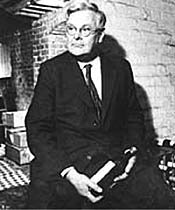Bad Food Guide
 Very interesting little documentary on BBC2 tonight about Raymond Postgate, the socialist historian and crime-writer, who was also the originator of the 'Good Food Guide' in 1951.
Very interesting little documentary on BBC2 tonight about Raymond Postgate, the socialist historian and crime-writer, who was also the originator of the 'Good Food Guide' in 1951. The insight into the awfulness of post-war British eating is truly fascinating, from Brown Windsor Soup and horsemeat to South African snoek and whale steaks.
Postgate railed against the complacency and often downright rudeness of catering provision, as it coasted along on the atmosphere of restriction and lack of flavour synonymous with WW2 rationing.
He was the founder and sole member of the 'Society for the Prevention of Cruelty to Food' - his rallying article in the weekly magazine The Leader- which led to the Good Food Club. Postgate simply asked that individuals anonymously rate eating establishments on a short form, nominating good ones to membership of the Good Food Club. The response was overwhelming, with nominations coming in from all over the country.
When The Leader shut down, Postgate undertook to compile the nominated restaurants, cafes and hotel dining rooms into a reference guide. As a method of quality control, he traveled around to each of them with his son as a dining companion and co-taster, including in the book those that satisfied his down-to-earth tastes and met his not unreasonable standards of service.
The first Good Food Guide included 'Tips for Eating Out', extremely patronising by today's standards, but designed to arm the middle class diner of the 1950's against 'the enemy' of the snotty waiter, careless chef and mercenary restauranteur. As such, it is credited with being the forerunner of the consumer movement.
The Guide captured the zeitgeist of eating out in post-war Britain, including many ethnic restaurants and in particular, local Indian restaurants, like Veraswarmas in London.
It also encapsulated the rise of the 'knowledgeable amateur' chef patrons, such as George Perry-Smith, and his restaurant The Hole in the Wall in Bath. Perry-Smith was a hip, bearded bohemian whose quality menu was inspired by the young food writer Elizabeth Davis. Together, they are seen by many as the vanguard of a new confident British cuisine and the move away from Brown Windsor Soup and surly service, championed by Raymond Postgate.
Good for them, I say, and for the British dining public!

0 Comments:
Post a Comment
<< Home